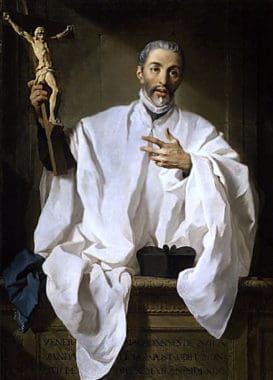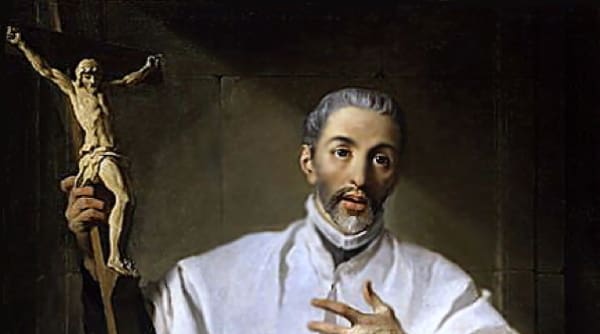St John of Avila’s master work in the spiritual life is Audi, Filia or Listen, O Daughter. This treatise for Sancha Carrillo, one of his penitents, was started while he was imprisoned by the  Inquisition. He continued to develop and revise the original text for more than thirty years. In fact, the final revisions were published five years after his death by his secretary.
Inquisition. He continued to develop and revise the original text for more than thirty years. In fact, the final revisions were published five years after his death by his secretary.
His spiritually rich content discloses itself through the lens of 16th century Spain. Under the shadows of the Inquisition, Reformation, and pop-spirituality, he wrote to carefully clarify Catholic teaching to protect the integrity of the faith. In particular, the Alumbrados – the Enlightened Ones – promoted an esoteric and syncretistic elitism that undermined the unity of the Church. At the same time, the light of the Council of Trent as well as that of the mysticism of 16th century Spain, purified and deepened his convictions around the primacy of contemplation in the life of the Church. The lights and shadows of his time suggest a pathway through the darkness of our own culture that makes use of the humble flame of hope entrusted to our care.
His goal is to guide us into a fruitful life of prayer so that Christ can restore His beauty in us and use our lives to reveal his mercy to the world. He is a master spiritual director who discerns the beautiful work God is about in each human soul who is open to Him. He also knows from his own life that mental prayer, a form of prayer that attends to the Lord in holy silence, requires a whole life of ongoing conversion – turning away from what is not merciful to what is so. Only as we renounce enchanting possibilities that crowd out God’s presence in our lives is there room in the heart for the vast horizons of God’s mercy.
Before Saint John of Avila elucidates the practice of contemplation, he distinguishes the deadly noise that distracts us from prayer. With a reference to the Odyssey, he describes Sirens whose shrill cacophony enchant and overwhelm the soul from within and without.
To his mind, prayer is listening in the heart to the whisper of God to the soul. To understand God we need to learn God’s language. The Master teaches that the purpose of language, of communication is communion not only with God but also in society and most importantly with oneself. God’s language establishes integrity of the heart and integrity in our relationships with each other. Contemplation is about welcoming God’s Word into the heart and responding to it – entering into an ongoing and life-changing conversation with God that leads to deeper and deeper communion with Him, each other, and with our own self.
Learning God’s language of communion is difficult because there are alienating languages that drown out His still small voice. There are languages that destroy our solidarity with others as at Babel and also break down our harmony with ourselves, our integrity, as happened in Eden. The Master wants us to appreciate the full danger of that irrational banality which incessantly speaks to us from the brokenness of human society and one’s own alienated misery. He sees a whole demonic contagion enveloping the world in deadly cacophony. It is a battle to tune these contentious languages of disunity out, but only when we do so are we able to tune into the delicate power of God’s Word in our soul.
To make these reflections practical, in our next post, we will explore his descriptions of the dark languages of the world, the flesh and the demonic. These languages speak into wounds in our hearts and cause wounds until it is impossible to see anything good – and under this enchantment, we live poisoned with the thought that it is evil and not God’s love that most defines our lives. Welcoming the Word of the Father requires silence of heart, a loving silence that learns the language of God.
+
PS from the Editor: If you want to read more of Anthony’s insights on the topic of prayer, don’t miss his book, Hidden Mountain Secret Garden. Anthony has an unusually profound understanding of mystical theology and lives a life of deep prayer. This book is an experience like no other. Among his many accomplishments and responsibilities, Dr. Lilles is a professor of theology at the Avila Institute.
+
Art for this post on St John of Avila: Learning the Language of God (Part I of II): Saint John of Avila, Pierre Subleyras, 1746, PD-US author’s life plus 100 years or less, Wikimedia Commons.





